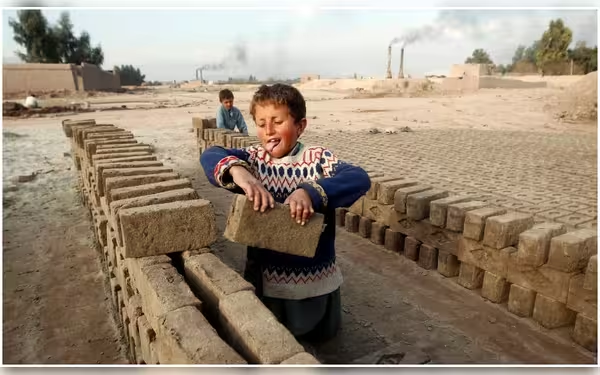Thursday, July 4, 2024 05:40 PM
Save the Children Raises Concerns in Afghanistan
- 1. 1.1 million children aged 5-17 engaged in labor in Afghanistan.
- 2. 6.5 million Afghan children at risk of severe hunger.
- 3. Urgent need to address child labor and food insecurity in Afghanistan.
 Image Credits: thefrontierpost
Image Credits: thefrontierpostThe International Labor Organization and Save the Children raise concerns about child labor and food insecurity in Afghanistan, emphasizing the urgent need for support and interventions to protect vulnerable children.
Amidst the challenging circumstances in Afghanistan, the International Labor Organization (ILO) has raised concerns about the alarming number of children engaged in labor activities. Approximately 1.1 million children, aged between 5 and 17, are enduring harsh working conditions, highlighting the urgent need to address child labor in the country. Factors such as economic struggles, ongoing conflicts, crises, and the impact of the COVID-19 pandemic have contributed to this distressing situation.
Recent data reveals that 1.06 million children in the same age group are involved in labor, making up 9% of the population. Challenges like poverty, natural disasters, and the return of Afghan refugees have further exacerbated the issue. While comprehensive surveys are lacking, there are suspicions that the number of child laborers has increased over time.
Save the Children has also drawn attention to the severe food insecurity in Afghanistan, with an estimated 6.5 million children, nearly 30% of the child population, at risk of severe hunger due to various factors like floods, drought, and displacement. Projections indicate that a significant portion of the Afghan population will face acute food shortages by October, with millions at risk of emergency levels of hunger.
Notably, children under five are among the most vulnerable, with around 2.9 million facing acute malnutrition in 2024. Save the Children's efforts to provide assistance and treat malnourished children, like 11-year-old Firoz from Northern Afghanistan, underscore the critical need for support. Healthcare professionals stress the financial challenges families face, depriving children of their rights, education, and proper nutrition, perpetuating a cycle of poverty that threatens the well-being of Afghan children.
The situation in Afghanistan demands immediate attention and concerted efforts to address child labor and food insecurity. It is crucial for stakeholders to prioritize the well-being of children, provide necessary support, and implement interventions to break the cycle of poverty and ensure a brighter future for Afghan youth. By working together and offering sustained assistance, we can make a meaningful difference in the lives of these vulnerable children.













